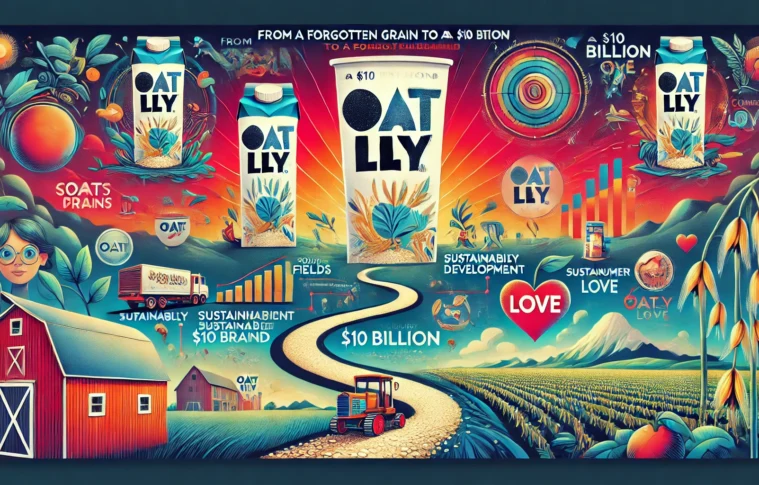Introduction
In just over two decades, Oatly has transformed from a niche, Swedish food product to a global plant-based milk brand with a cult following. The company’s meteoric rise has disrupted the dairy industry and propelled oat milk into the mainstream. With its unique branding, sustainability-focused mission, and ability to tap into shifting consumer preferences for plant-based alternatives, Oatly has carved out a multi-billion-dollar market position.
This case study will examine Oatly’s journey from its inception in Sweden to its rapid international expansion, exploring the company’s business model, branding strategy, and market challenges, while also analyzing the key factors behind its success and future prospects.
The Origins of Oatly
Oatly was founded in 1994 in Malmö, Sweden, by Rickard Öste, a food scientist who recognized the potential of oats as an alternative to dairy. The company initially began as a small innovation in the food and beverage space, driven by Öste’s desire to create a healthier, plant-based alternative to cow’s milk that would appeal to people with lactose intolerance or dairy allergies. The breakthrough came when Öste and his team developed an enzymatic process that turned oats into a milk-like beverage.
Oatly’s early years were focused on research and development, and the product was introduced in Swedish health food stores in 1996 under the name “Oatly.” Despite its success within the health-conscious community, the company remained relatively unknown outside of Scandinavia for nearly two decades.
The Shift from Local Brand to Global Phenomenon
1. Rebranding and Marketing
Oatly’s real breakthrough came when it adopted a bold and unconventional approach to branding and marketing. The company recognized the importance of appealing not only to health-conscious consumers but also to those concerned about sustainability and the environmental impact of food production.
The company’s marketing strategy shifted from focusing on the health benefits of oat milk to highlighting its environmental advantages over dairy milk. In a world increasingly concerned with climate change, Oatly capitalized on the growing demand for sustainable and ethical food options.
In 2013, Oatly relaunched its brand with a unique marketing strategy centered around its quirky and irreverent voice. Its ads featured minimalistic design, humorous messaging, and a tongue-in-cheek attitude. For example, Oatly’s packaging includes slogans such as “Wow, no cow!” and “It’s like milk, but made for humans.” These clever and memorable taglines resonated with consumers, especially Millennials and Gen Z, who were seeking brands that reflected their values of sustainability, health, and social responsibility.
This move helped Oatly stand out in a crowded market of plant-based beverages, and its commitment to transparency, sustainability, and originality built a loyal customer base.
2. Product Innovation
Oatly’s focus on innovation has also played a key role in its rise to prominence. The company’s product offerings are diverse, catering to a range of dietary preferences and needs. Oatly’s original oat milk product has been joined by various variations, including oat-based yogurt, ice cream, and even coffee creamers.
Oatly’s continued success has been driven by its ability to refine and improve the taste, texture, and functionality of its products. In particular, Oatly’s barista blend oat milk has been a game-changer in the coffee industry, allowing baristas to achieve the perfect texture and froth when adding milk to espresso-based drinks. By prioritizing taste and functionality, Oatly has built a strong reputation as a premium, high-quality alternative to dairy milk.
Business Model and Key Drivers of Success
1. Sustainable and Ethical Operations
Oatly has positioned itself as a leader in sustainable production practices. Its environmental commitment is a core element of its brand identity. By focusing on oats—an environmentally friendly crop that requires significantly less water and land than dairy cows—Oatly has been able to market itself as a climate-conscious alternative to dairy milk. This sustainability-driven approach has earned Oatly a loyal following among eco-conscious consumers, especially in the wake of mounting concerns about climate change and the environmental impact of the agricultural industry.
Oatly’s transparency in its supply chain and environmental reporting further strengthens its appeal to socially conscious customers. In its 2020 Impact Report, Oatly highlighted its commitment to reducing carbon emissions and water usage, showcasing its dedication to sustainability.
2. Strategic Partnerships and Global Expansion
Oatly’s expansion strategy has been centered around entering new markets with strategic partnerships. In the early 2000s, Oatly expanded its presence to neighboring countries in Europe and eventually made inroads into the U.S. market. However, it wasn’t until 2016 that Oatly began its major global expansion with the opening of a U.S. production facility.
Strategic partnerships have been instrumental in Oatly’s global growth. The company’s collaboration with Starbucks to offer Oatly’s oat milk in their cafes was a game-changer. This partnership not only provided Oatly with significant brand visibility but also helped oat milk gain mainstream acceptance as a viable alternative to dairy. Oatly’s presence in major coffee chains, including a partnership with McDonald’s, has positioned it as the leading oat milk provider for coffee drinks worldwide.
By 2021, Oatly was available in over 20 countries, including the U.S., China, the U.K., and several countries across Europe. The company’s international footprint continues to grow, with Oatly expanding into new regions and product lines, such as foodservice and e-commerce.
3. Raising Capital and Scaling Up
Oatly’s rapid growth has been fueled by significant venture capital investment. In 2020, the company raised $200 million in a funding round led by high-profile investors, including Blackstone Group and Oprah Winfrey. This injection of capital allowed Oatly to expand its manufacturing capacity, support product development, and scale its global operations.
Oatly’s IPO in May 2021 was another significant milestone, marking the company’s entry into the public markets with a valuation of $10 billion. The IPO provided Oatly with additional funds to continue its expansion while also increasing its visibility as a leading player in the plant-based food and beverage industry.
Challenges Faced by Oatly
1. Competition in the Plant-Based Market
While Oatly’s growth has been impressive, it faces increasing competition from other plant-based milk brands, including Almond Breeze, Silk, and Califia Farms. In addition, major dairy companies like Nestlé and Danone have also entered the plant-based market, intensifying competition.
Oatly must continually innovate and differentiate itself to maintain its leadership position. Despite these challenges, the company’s strong brand identity and loyal customer base give it a competitive edge.
2. Supply Chain and Production Capacity
Oatly has faced challenges in scaling its production to meet rising demand. Its rapid expansion has at times outpaced its production capabilities, leading to supply chain bottlenecks. In response, the company has invested heavily in building new production facilities, including a second plant in the U.S. and new plants in Europe and Asia.
3. Balancing Growth with Sustainability
As Oatly scales its business, it faces the challenge of maintaining its sustainability credentials while growing at an accelerated pace. The company has made significant strides in reducing its carbon footprint, but ensuring that growth does not come at the expense of environmental responsibility will continue to be a critical challenge moving forward.
Key Metrics and Financial Performance
| Metric | Value |
| Company Valuation (2021) | $10 billion |
| Revenue (2020) | $421 million |
| Global Market Share (2021) | 13% (Oat Milk) |
| Production Capacity | Over 1 million tons of oats per year |
| Number of Employees | 1,500+ |
| Number of Countries | 20+ |
Conclusion
Oatly’s rise from a niche Swedish product to a global $10 billion brand is a remarkable success story fueled by innovation, bold marketing, and a deep commitment to sustainability. By capitalizing on the growing demand for plant-based and environmentally friendly products, Oatly has built a brand that resonates with consumers and challenges the status quo of the dairy industry.
The company’s focus on high-quality products, sustainability, and strategic partnerships has allowed it to build a loyal customer base and secure its position as the leading plant-based milk provider globally. However, as the competition in the plant-based space intensifies and supply chain challenges persist, Oatly will need to continue to innovate and expand its production capabilities to maintain its momentum.
Oatly’s journey is a prime example of how a company can disrupt an established industry by aligning itself with the values and needs of modern consumers. With continued focus on sustainability and growth, Oatly’s oatstanding journey is far from over.



